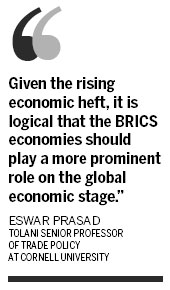

NEW YORK - While leaders of the world's five largest emerging economies concluded their meeting looking for bigger roles in international affairs, experts have predicted an optimistic but uneven road ahead.
|
||||
"Given the rising economic heft, it is logical that the BRICS economies should play a more prominent role on the global economic stage," said Eswar Prasad, the Tolani senior professor of trade policy at Cornell University and the former head of the IMF's China division.
However, he said that the G20 process still tends to be dominated by developed economies.
|
 |
The key priority, Prasad said, is for BRICS countries to put creative ideas on the table rather than just reacting defensively to proposals put forward by advanced economies.
"The BRICS are only gradually growing into this leadership role, and their summits should help them craft and refine a common agenda," Prasad said.
David Rothkopf, a visiting scholar at the Carnegie Endowment, said that he is optimistic about BRICS' future because he believes that its rise as an influential force in global affairs is irreversible and is driven by historical factors more than momentary political opportunism.
"They will gain more prominent roles due to their size and their growth. The role of BRICS within international institutions like the IMF, the World Bank and the United Nations must necessarily grow," Rothkopf said.
But he cautioned that the process of changing those roles will be frustrating and slower than it should be. "It will be marked by foot-dragging from established powers reluctant to see their relative influence diminish," said Rothkopf, who played a key role in developing and directing the Clinton administration's Big Emerging Markets Initiative. Rothkopf believes that the BRICS nations should act as they have been, setting their own agenda and advancing it as best as they can.
"Each situation offers different opportunities for forming coalitions with other powers," he said, adding that on the Libya vote, the collective voted with Germany to abstain and on other issues such as World Bank or IMF structure, they may vote with other emerging economies more broadly.
"They need to be flexible and creative. That said, they also must demonstrate that they don't just want to be led, they are ready to lead. They must accept a greater responsibility for helping address global problems and contain global threats if they wish to truly be seen as leaders," he said.